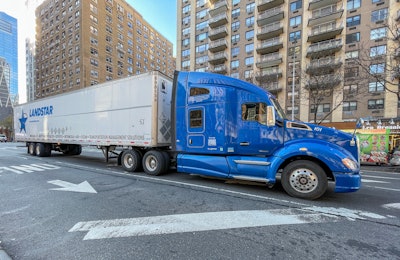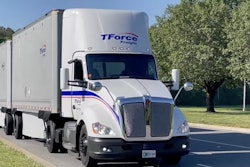
The Trump administration is pulling the plug on a prior approval of New York City’s congestion pricing program that took effect at the beginning of this year.
The Federal Highway Administration announced Wednesday it has terminated approval of the pilot for New York’s Central Business District Tolling Program (CBDTP).
In a letter to New York Gov. Kathy Hochul, DOT Secretary Sean Duffy rescinded a Nov. 21, 2024, agreement signed under the FHWA's Value Pricing Pilot Program (VPPP). DOT's move effectively ends tolling authority for New York City’s cordon pricing plan, which imposes tolls on drivers entering Manhattan below 60th Street.
In the letter, Duffy noted that President Trump asked him to review FHWA’s approval of the program. “In particular, the President expressed his concerns about the extent of the tolling that was approved by the Department of Transportation on highways that have been constructed with funds under the Federal-aid Highway Program and the significant burdens on New York City residents, businesses, and area commuters (including those from New Jersey and Connecticut) who regularly use the highway network in the CBD tolling area.”
[Related: New York governor relaunches NYC congestion pricing plan]
As detailed in the letter, Duffy is terminating the program for two reasons: first, the scope of the CBDTP is “unprecedented” and “provides no toll-free option for many drivers who want or need to travel by vehicle in this major urbanized area.” Second, the toll rate was set primarily to raise revenue for the Metropolitan Transit Authority, rather than at an amount needed to reduce congestion. By doing so, the pilot runs contrary to the purpose of the VPPP, which is to impose tolls for congestion reduction, not transit revenue generation.
“New York State’s congestion pricing plan is a slap in the face to working class Americans and small business owners,” Duffy said. “Commuters using the highway system to enter New York City have already financed the construction and improvement of these highways through the payment of gas taxes and other taxes. But now the toll program leaves drivers without any free highway alternative, and instead, takes more money from working people to pay for a transit system and not highways. It’s backwards and unfair.”
Duffy also highlighted the impact on trucks entering the area covered by tolls. “Finally, it impedes the flow of commerce into New York by increasing costs for trucks, which in turn could make goods more expensive for consumer,” he said.
Late last year, New York Gov. Kathy Hochul announced the revival of the congestion pricing program after it had previously been put on hold. Under the new agreement that took effect Jan. 5, the cost of the tolls was reduced 40% from the original plan.
Large trucks are required to pay $21.60 to enter Manhattan below 60th Street with E-ZPASS, and small trucks are required to pay $14.40. There are discounts of 75% for nighttime entries to the Central Business District between 9 p.m. and 5 a.m. on weekdays, and 9 p.m. and 9 a.m. on weekends.
Prices were set to increase incrementally to eventually reach the original pricing plan of $36 for trucks in 2031 and beyond.
The Trucking Association of New York, which previously filed a lawsuit against the Metropolitan Transportation Authority over the tolls, voiced its support for the DOT's decision to terminate its approval of the plan.
"We stand with President Trump and Secretary Duffy in their efforts to end the congestion pricing program," said Kendra Hems, president of the Trucking Association of New York. "We agree with their decision to halt this program, and we hope it leads to an immediate cessation of the collection of tolls."
TANY added that, to actually address congestion and emissions, "New York City should invest in initiatives such as the burgeoning microhubs program, off-peak hours delivery incentives, and operator subsidies for electric vehicle conversion."
[Related: NY trucking group files lawsuit over 'unfair' congestion tolls on trucks]
Todd Spencer, President of the Owner-Operator Independent Drivers Association, lauded the DOT's decision to rescind the tolling authority of the program.
"Truckers often have very little control over their schedules, so this congestion pricing plan is particularly problematic for owner-operators and independent drivers," he said. "We routinely have no other choice than to drive through metropolitan areas during periods of high congestion because of the rigidity of current federal hours of service requirements. Additionally, shippers and receivers generally have little regard for a driver’s schedule, frequently requiring loading and unloading to occur at times when nearby roads are most congested."
Spencer went on the call the plan "anti-trucker to begin with," adding that OOIDA "will continue fighting to ensure it doesn’t come back. Beyond New York City, we encourage the Trump Administration and Congress to fight the expansion of tolling across the country."
The American Trucking Associations also applauded DOT's effort.
“Truckers don't drive into Manhattan to sightsee," said ATA President and CEO Chris Spear. "They do it because customers depend on them. The deliveries they make are essential to businesses and residents and keep New York City running."
“Truckers deserve our gratitude," Spear added. "Instead, New York imposed a $21.60 toll -- eventually climbing to $36 -- each time they crossed south of 60th Street. Even worse, the proceeds of this shakedown were not dedicated to improving roads and bridges, but instead subsidized a bloated and mismanaged transit bureaucracy that has proven unable to control spiraling costs. New York’s subways were never going to deliver the city’s freight."
[Related: Court rules Rhode Island can reinstate truck tolls -- without daily caps]









